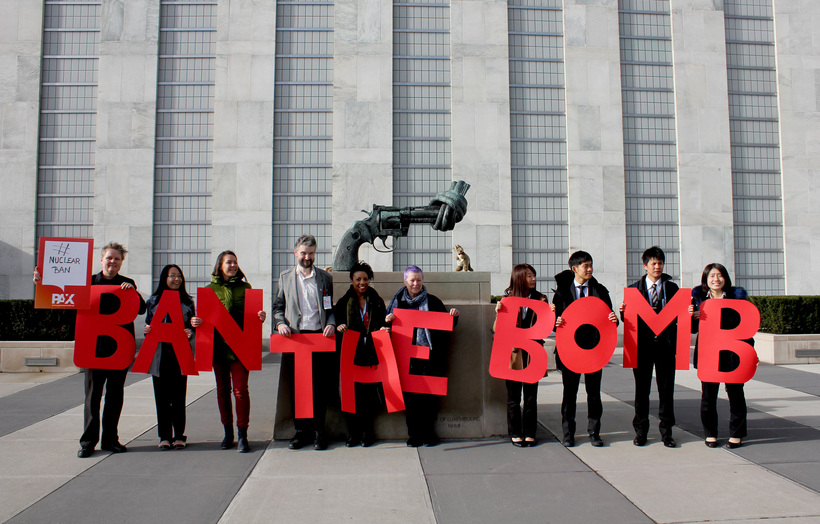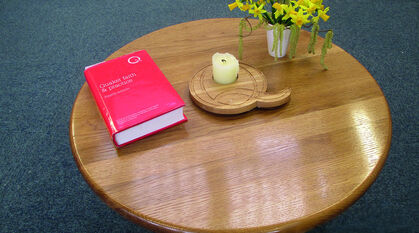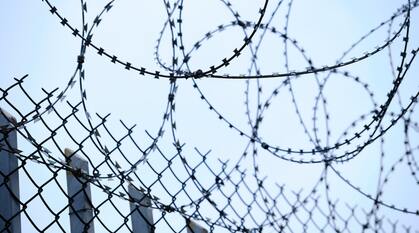INF treaty collapse: a call to disarm
Daniel Jakopovich reflects on worrying global developments around nuclear weapons and what Quakers can do to create a culture of peace.

The US government's recent decision to withdraw from the bilateral Intermediate-Range Nuclear Forces (INF) Treaty is an ominous development. Russia responded by announcing that it will follow suit, further contributing to this dramatic erosion of global security.
For over 30 years, the INF Treaty between Russia and the US underpinned the system of global nuclear arms control. It led to the dismantling and destruction of close to 2,700 nuclear missiles, and on-site inspections to make sure the treaty was being upheld. This partial nuclear disarmament and the accompanying system of nuclear arms control assisted the processes which ultimately led to the end of the Cold War.
Collapse of the treaty
The collapse of the INF treaty comes in a context of increasingly belligerent US-Russia relations, and of great power competition and conflict more generally. It is part of a wider shift away from the (limited) efforts to achieve nuclear de-escalation. This shift has included the development and promotion of 'low-yield' or 'tactical' nuclear weapons, which increase the scope for and plausibility of nuclear weapon use.
Last year the US also turned away from the Iran nuclear deal. The International Campaign to Abolish Nuclear Weapons has warned that the abandonment of efforts to constructively engage with Iran “risks igniting new conflict rather than reducing the risk of nuclear war". At the same time, the US administration of Donald Trump is seeking to sell highly sensitive nuclear technology to Saudi Arabia.
The collapse of the INF treaty increases the possibility that Europe could become an arena for nuclear confrontation. It was the introduction of the INF treaty – coupled with a mass campaign of public protest – which previously led to the removal of US intermediate-range nuclear missiles from Europe. The potential reintroduction of nuclear missiles would dramatically increase tensions and could make nuclear war more likely.
The abandonment of the INF Treaty is inaugurating a terrible new nuclear arms race. Both the US and Russia are now investing vast resources in developing their nuclear arsenals. The consequences for the world of this policy shift could be catastrophic.
Structural violence
In addition to being a persistent threat to all life on Earth, nuclear weapons also amount to immense structural violence, preventing the establishment of positive peace. According to a conservative estimate, Britain's replacement of the Trident nuclear weapons system will cost at least £205 billion. Meanwhile, according to a study published in the British Medical Journal, cuts to healthcare and social care budgets may have resulted in around 120,000 excess deaths between 2010 and 2017 in England alone. This appalling figure demonstrates that real human security, human rights and well-being continue to be sacrificed to maintain this apparatus of mass murder. The new nuclear arms race will drastically increase structural violence.
Campaigning for nuclear disarmament
Quakers have long advocated the use of treaties to promote international peace and cooperation, and have played an active part in the movement for nuclear disarmament. Recently, Northern Friends Peace Board worked with other members of the Network of Christian Peace Organisations (NCPO) to produce the Nuclear Weapon Ban briefing.
In February open military hostilities erupted between two nuclear weapons states, India and Pakistan. Grassroots campaigners from both countries challenged the march to war by speaking out en masse to #SayNoToWar. It showed the fragility of peace but also the power of ordinary citizens to influence political leaders.
In the UK we can also act to build support for existing nuclear control treaties, and continue to call on UK politicians to back the historic UN Treaty for the Prohibition of Nuclear Weapons.
Work to abolish nuclear weapons is part of a broader endeavour to advance the public ethic of peace and love, whose widespread adoption would open the road to peace and disarmament.
The Quaker peace testimony calls us to work against militarism and to build a culture of peace. In the context of a new nuclear arms race, and the increased threat of nuclear war, we must strengthen our support for the movement to rid the world of all weapons of mass death and destruction, and be part of the broader movement for a peaceful future.
5 ideas for action:
- Read and share the Nuclear Weapon Ban Briefing (PDF) produced by the Network of Christian Peace Organisations.
- Write to your elected representatives asking them to support nuclear arms control. This could include the Nuclear Ban Treaty, the UK's nuclear disarmament, and the use of UK diplomatic influence to protect and promote international cooperation on nuclear arms control.
- Organise a public meeting to raise awareness about the danger of nuclear escalation, the importance of the INF treaty and of nuclear disarmament.
- Share CND's peace education resources with your local school.
- Organise a film showing or cultural event for peace and nuclear disarmament.
Read Network of Christian Peace Organisations' nuclear ban briefing


